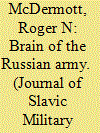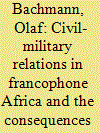| Srl | Item |
| 1 |
ID:
130024


|
|
|
|
|
| Publication |
2014.
|
| Summary/Abstract |
Following the Russia-Georgia War in August 2008, Russia's conventional Armed Forces were subjected to a far reaching and unpredictable reform. Although the Armed Forces were long overdue reform, previous efforts rapidly failed for a variety of reasons including institutional inertia, in-fighting within the military elite and a lack of consensus on the goals and targets of such reform. The reforms of 2008-12 were therefore unprecedented since the creation of Russia's Armed Forces in 1992 following the disintegration of the USSR in late 1991; major changes were actually implemented. Yet, the reforms that followed were haphazard, poorly implemented and frequently experienced setbacks, reversals and an overall lack of coordinated policy efforts. These issues are examined in the following paper, exploring the roots of Russian defense planning weaknesses, and the numerous policy zigzags of the reforms to the structure of the Armed Forces, officer downsizing, NCO development and many other issues within a political-military culture that actually mitigates time-phased and fully worked-out planning cycles. Moscow's blindness to the utility of reliable military statistics will ensure continued 'blind planning' and institutional guesswork until obsessive secrecy and state level corruption give way to more scientific approaches to forming, implementing and managing such strategic level change within the country's defense and security structures.
|
|
|
|
|
|
|
|
|
|
|
|
|
|
|
|
| 2 |
ID:
132271


|
|
|
|
|
| Publication |
2014.
|
| Summary/Abstract |
The Building Security Overseas Strategy is at its core an 'Intervention to end all Interventions' - from a Western as well as an African perspective. Two of its main pillars are security sector reform in specific countries and systematic support to the development of the African Peace and Security Architecture. This article addresses the question why such efforts have met little success in francophone Africa. It argues that the failure of Western advisers to understand the sociological dynamics of African armed forces, shaped by a political culture based on personal loyalty to the leader, is at the root of the problem. In that context, the Huntingtonian-type distinction between the civilians and the military does not apply as military and civilians act in concert within common clientelism systems. As a result of the curtailing of the state-formation experience in most African countries, the military never had to demonstrate its performance as a state builder, nor did it have to bargain its legitimacy against the support of the citizens. Partnership in that context will remain a misnomer, at least until African military can credibly demonstrate commitment to state-building grounded in a broad-based social contract.
|
|
|
|
|
|
|
|
|
|
|
|
|
|
|
|